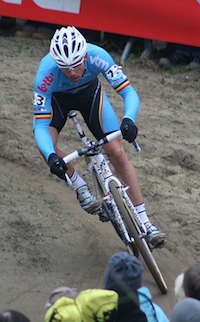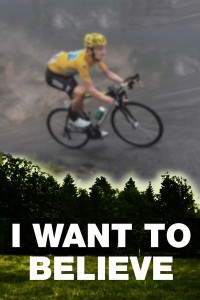
I consider myself among the more optimistic commentators as far as cycling and doping go. But as the year wraps up, I can’t help but think a nice Resolution for the sport might be to stop asking me to ignore what a more cynical man might call “the obvious”.
Consider the example of Sven Nys, who won yesterday’s World Cup in Zolder in a not-exactly-unpredictable fashion. This same Sven Nys rode the first decade of his career on a Rabobank team that’s alleged to have had an in-house doping program, and at the very least, explicitly tolerated doping for the sweeping majority of the Belgian’s time there.
In fact, when Nys finally did announce plans to jump ship to Landbouwkredeit (after an introduction from confessed doper Filip Meirhaeghe), it came just a few months after the Rabobank team had conducted a thorough investigation and sweeping internal changes in the wake of the Rasmussen Debacle.
Nys’ comment upon announcing his new team that “all noses must be in the same direction” would perhaps be echoed later when team doctor Geert Leinders also parted ways with the squad, citing disagreements with Rabobank management over a period 18 months—or, to put it another way, beginning just after the Rasmussen Report.
When news surfaced this month that recently confessed doper Levi Leipheimer had named Leinders as a supplier, Nys was quick to defend the “very honest” doctor, adding that they’re friends, and still call each other occasionally—just in case, y’know, anyone finds some phone records or something.
Because after all, what great cyclist wouldn’t stick up for a friend who just also happens to also be a doctor accused of helping people dope? And obviously, nothing untoward is happening because Nys’ “real” coach—who also happens to run a highly-visible brand and business—has a perfectly good, dope-free explanation for Nys’ continued success.
It’s important to note that these statements aren’t meant as any kind of allegation against Nys—at least, not beyond lousy media management.
Aside from the fact that ‘cross is a discipline full of questions for which the answer is not “more watts”, the coincidences above are explained away as chance coincidence without too much suspension of disbelief. But after 15 years of being asked to believe that injections were vitamins, twins were vanished, ex-coworkers were merely disgruntled, I’d like storylines that offer me fewer alternative theories to ponder.
For instance, you’d have to be awfully doe-eyed to write off the recent work of Dr. Leinders as utterly unremarkable. Within a year of his arrival at Team Sky, Chris Froome emerged out of nowhere as one of the best stage racers in the world. In 2012, Sky dominated event after event before throttling the Tour de France with a fury not seen since Lance Armstrong’s first retirement. While there were many specific differences between Sky and USPS in its heyday, it’s still difficult to rattle them off without feeling just a touch ingenuous.
Sky management did little to allay the worry. Dave Brailsford, who’d built a team to crown a British Tour winner within five years, suddenly found himself with two contenders for the throne. When Leinders’ name came up at this year’s Tour, Sky blithely replied that he was merely a “reputational risk”, conveniently not mentioning that his hiring marked a stark reversal of the team’s initial stance on staffing.
As the low-level drama wore on through the remainder of the season, the only thing consistent about Sky’s messaging was that it had “done the right thing”. And the squad’s only internal change resulting from the kerfuffle was an “I’ve-never-doped-pledge” that is widely regarded as counterproductive and nonsensical.

Again, I want to clarify that this is not an accusation. Aside from the lack of any evidence (outside unprecedented Tour success), if Leinders is indeed another Ferrari or Fuentes, why was Rabobank so roundly mediocre as a Tour GC team during his tenure there, routinely outperformed US Postal, ONCE, Telekom, and the rest?
Plus, if Rabobank began its in-house doping program after the ’99 Tour, why did Michael Boogerd’s best finish at come a year before they took up institutionalized doping?
Still, every time I dig around for additional information to flesh out the “let’s assume these guys aren’t on drugs” angle on a given topic, I feel just that little bit more ridiculous. It’s not that I’m beginning to buy into the lazy, self-satisfied explanation of “well, everyone is clearly on drugs”, but it sure would be nice to do less work to find a sensible way around it.
Thanks for touching on the Froome issue. From day one it struck me as out of line but all focus (suspicion) was on Wiggins even though he took 4th with Garmin without special status within the team. Froom’s byline of ‘the guy from Kenya’ somehow, miraculously, took heat off him. But we can rest assured …. he has probably been tested, like, at least 300 times by now.
2010:May – Armstrong’s former US Postal team-mate Floyd Landis launches allegations against the Texan. 2011:May – Forced to deny claims made by former team-mate Tyler Hamilton that they took performance-enhancing drugs together.2012:February – An investigation into alleged doping by Armstrong is dropped by federal prosecutors in California. June – United States Anti-Doping Agency (USADA) confirm they will file formal doping charges against Armstrong. July – Armstrong files lawsuit against USADA accusing them of “corrupt inducements” to other cyclists to testify against him. August 20 – Armstrong’s legal action dismissed in court. August 24 – Armstrong announces he will not fight doping charges filed against him but insists he is innocent. He is stripped of all his titles and banned from cycling for life by USADA. October 10 – USADA claim 11 of Armstrong’s former team-mates have testified against him. October 22 – Cycling’s world governing body, the UCI confirms it has ratified USADA’s decision to ban Armstrong from cycling for life and to strip him of his seven Tour de France titles for doping offences.